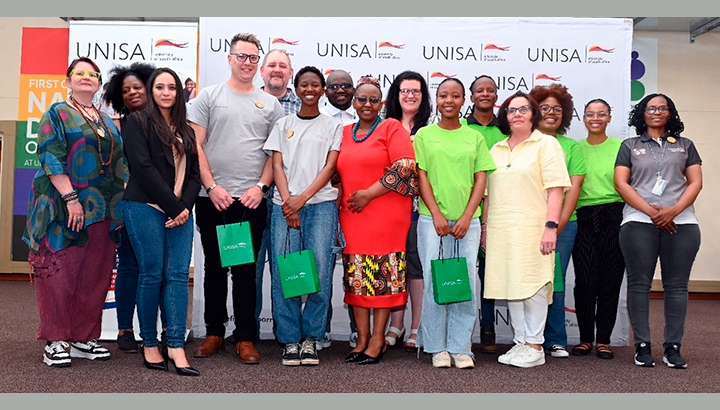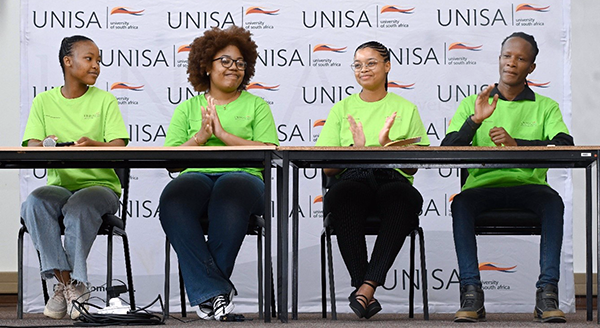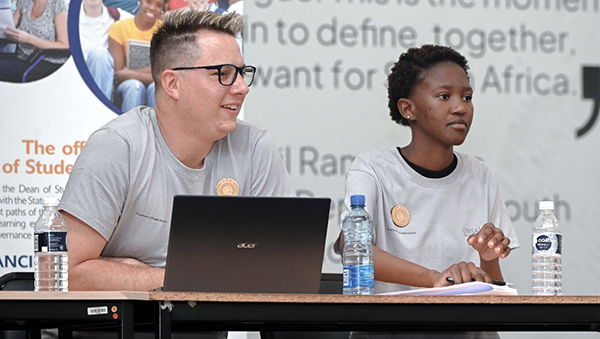News & Events
Unisa first-year students shine at inaugural debate session

The debate teams, moderator, judges and staff from the Office of the Dean of Students
The Office of the Dean of Students, in collaboration with the Department of English Studies, hosted an engaging inaugural debate session for Unisa first-year students on 2 September 2025 at the Unisa Sunnyside Campus. The programme was designed specifically for first-year students, with the primary objective of bridging their basic education with Unisa's comprehensive open distance e-learning (CODeL) environment.
This landmark event provided a platform for first-year students to showcase their academic engagement, critical thinking and communication skills. The debate topic, “Climate change should be prioritised by government, business and educational institutions”, inspired passionate arguments from all participants and deepened discussion on one of the most pressing global issues of our time. The topic encouraged participants to explore how different sectors can work together to deal with climate change while enhancing their research, communication, and analytical abilities in a cooperative, intellectually stimulating environment.
The debate featured six participants: four debaters – Botlhale Phaka, Motheo Botlhoko, Didintle Oreratile Modisakeng and Lethabo Precious Mabena – argued in favour of the motion and two debaters – Michael Vincent Dyke and Angel Vukeya – opposed it. All participants were exceptionally well-prepared, reflecting both their dedication and the high quality of the training they received. Their outstanding preparation, intellectual rigour and teamwork were evident throughout the debate.
In preparation for the event, an online training session was held on 5 August 2025 via Microsoft Teams, led by Claudia Fratini and Russel Goldman from the Department of English Studies. The trainers provided guidance on argument structure, rebuttal techniques and research strategies. Fratini encouraged participants to use a dedicated Discord server for real-time engagement and practice, which the debaters enthusiastically embraced. Continued mentorship and check-ins were conducted via Microsoft Teams in the weeks leading up to the debate.
On the day of the event, Russel Goldman moderated and facilitated the debate following messages of support from Lizette Le Roux, Deputy Director: Student Development, and Ndabidi David Bopape, Tshwane Regional Student Representative Council (RSRC) Undergraduate Officer. The debaters demonstrated impressive research, logic, rhetorical skill and teamwork. Their arguments, ranging from scientific facts to policy implications, reflected both the complexity and urgency of the climate change discourse.
Comments from the session
Moderator's comment
Goldman commented as follows: “The judges were professional and supportive and provided valuable feedback, showing sensitivity to the students' pressures. The student debaters were impressive, showing significant improvement in preparation and confidence, performing strongly despite some debating for the first time.”
Judge's comment
Lesiba Simon Mojapelo from the Department of Information Science commented as follows: “The debate session was engaging and thought-provoking, providing a valuable platform for exchanging diverse perspectives. It meaningfully advanced the dialogue on climate change, with high participation and well-informed, passionate arguments from the participants.”

The proposition team, from left: Lethabo Precious Mabena, Motheo Botlhoko, Botlhale Phaka, and Didintle Oreratile Modisakeng
Participants for the motion
The proposition team shared that the experience challenged them to step outside of their comfort zone and improved both their critical thinking and public speaking skills. They expressed that they now feel more equipped to speak up on important topics.

The opposition team, from left: Michael Vincent Dyke and Angel Vukeya
Participants against the motion
The opposition team shared that debating against a popular motion was challenging but rewarding since it taught them the importance of understanding multiple perspectives and defending a position with logic and evidence.
The debate concluded in a tie, with all participants receiving gifts and virtual certificates of participation in recognition of their efforts.
The event left the audience with new insights and much to reflect on. Initiatives such as this not only showcase student talent but also highlight Unisa's commitment to nurturing critical thinking, public engagement and academic excellence. This successful debut paves the way for future debates and continued departmental collaboration to help students become knowledgeable, articulate and involved global citizens.
* By Mmangakane Yvonne Mmako, Training, Research and Capacity Development Practitioner (Acting), Directorate of Student Development
Publish date: 2025/10/29
